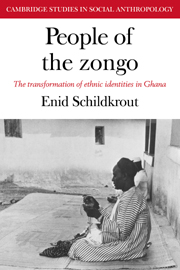Book contents
- Frontmatter
- Contents
- List of tables, figures, and maps
- Preface
- Glossary
- I Ethnicity and migration
- II Kinship and community
- III Politics and change
- 8 The political history of the zongo community: 1900–1970
- 9 The social organization of the Mossi community
- 10 Ethnicity, generational cleavages, and the political process
- 11 Conclusion: ethnicity, cultural integration, and social stratification
- Notes
- Bibliography
- Index
11 - Conclusion: ethnicity, cultural integration, and social stratification
Published online by Cambridge University Press: 29 October 2009
- Frontmatter
- Contents
- List of tables, figures, and maps
- Preface
- Glossary
- I Ethnicity and migration
- II Kinship and community
- III Politics and change
- 8 The political history of the zongo community: 1900–1970
- 9 The social organization of the Mossi community
- 10 Ethnicity, generational cleavages, and the political process
- 11 Conclusion: ethnicity, cultural integration, and social stratification
- Notes
- Bibliography
- Index
Summary
The incorporation of immigrant groups into the zongo and the simultaneous persistence of ethnicity are two analytically separable processes of change. In the example presented in this book, incorporation - political, economic, religious, and social - often entails the abandonment of traditional culture and the adoption of new behavior patterns. Nevertheless, this does not preclude the reassertion of ethnic identities based on provenance in constantly changing forms. Through a comparison of Mossi immigrants in two generations, I have tried to show that cultural change does not necessarily lead to the disappearance of ethnicity; not only do new ethnic identities and new cultural patterns emerge, associated with the incorporation of immigrants into larger communities, but older identities persist also, with new symbols being adopted to maintain boundaries.
While the discussion has been restricted to the case study presented here, this situation is by no means unique. It is characteristic of many societies the world over - rural or urban, industrial or preindustrial - where peoples of diverse origins have come together, by choice or not, to create new communities. It is characteristic of all situations where memories of separate histories have been transformed into markers of social, political, or economic status. If one insists, as I have, on looking at ethnicity in time perspective, as a process of social and cultural change, one will probably be struck by how rare are those situations where ethnicity implies the persistence of “traditional” cultural identities.
- Type
- Chapter
- Information
- People of the ZongoThe Transformation of Ethnic Identities in Ghana, pp. 264 - 277Publisher: Cambridge University PressPrint publication year: 1978



